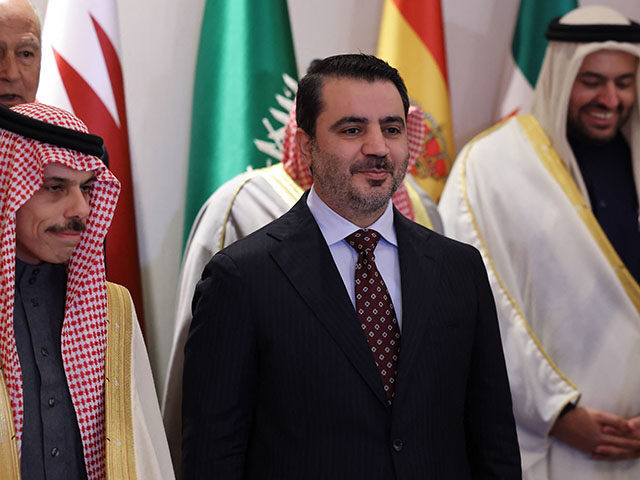Saudi Arabia hosted a large summit on Sunday — featuring American and European as well as Middle Eastern diplomats — to discuss the future of Syria, during which its officials called for lifting sanctions on the country to give its new regime a chance to recover from the civil war.
Syria is under one of the world’s most onerous sanctions regimes, intended to isolate deposed dictator Bashar Assad in response to more than a decade of human rights atrocities against his own people. Assad used disproportionate violence to shut down protests in 2011, prompting the Syrian Civil War, which at its peak featured ten different belligerent actors and created a vacuum for the Islamic State to build a “caliphate” centered around the northern city of Raqqa.
The civil war reached a somewhat dormant state after the collapse of the “caliphate” in 2017 that abruptly ended in November, when the al-Qaeda offshoot Hayat Tahrir al-Sham (HTS) attacked Assad forces in Aleppo, Syria’s second-largest city. HTS rapidly seized control of Aleppo and marched deeper into Assad strongholds until reaching the outskirts of Damascus in early December, prompting Assad to flee to Russia and his regime to collapse.
HTS is now the de facto government of Syria, led by Ahmed al-Sharaa, formerly known by the jihadist nom de guerre Abu Mohammed al-Jolani. Sharaa has abandoned his war uniform and begun wearing Western-style suits, assuring that his terrorist organization would lead an “inclusive” government respectful of ethnic and religious minorities in the country. Sharaa has insisted that government would be Islamist, however, and scolded that “people who fear Islamic governance either have seen incorrect implementations of it or do not understand it properly.”
Sharaa’s campaign for legitimacy included granting a meeting to representatives of the administration of outgoing American President Joe Biden in late December, which resulted in the United States lifting a $10 million bounty on his head. HTS remains a U.S.-designated Foreign Terrorist Organization, however, and Sharaa remains a “specially designated global terrorist.”
Sharaa has promised to dismantle HTS and integrate it into a revamped Syrian national military. He is also encouraging the world to lift sanctions on Syria on the grounds that the sanctions were meant to cripple the no-longer-existent Assad regime.
The Saudi government appeared to agree with that sentiment. In a statement during the summit on the future of Syria on Sunday, Foreign Minister Prince Faisal bin Farhan bin Abdullah Al Saud urged the world to “coordinate efforts to support Syria and work towards lifting the sanctions imposed on it.”
Prince Faisal, the Saudi Ministry of Foreign Affairs (MOFA), in a readout of the meeting, “stressed that the continuation of sanctions imposed on the former Syrian regime will hinder the aspirations of the Syrian people for development, reconstruction, and stability.”
“His Highness expressed the Kingdom’s appreciation for the countries that announced their provision of humanitarian and development aid to the Syrian people,” it added.
Prince Faisal credited the Biden administration for issuing waivers to existing sanctions to allow for humanitarian aid while HTS builds a functional government and called “on international parties to lift unilateral and international sanctions imposed on Syria, and to urgently provide all forms of humanitarian, economic, and capacity-building support for the Syrian state, which will create the appropriate environment for the return of Syrian refugees.”
The foreign minister also praised the HTS regime for taking “positive steps” toward a “dialogue-based approach with the Syrian parties” and for “committing to combating terrorism.”
The summit on Sunday boasted a long guest list of diplomats from America, the European Union, the Arab States, the United Nations, and a host of neighboring states including Turkey, Jordan, Iraq, the United Arab Emirates (UAE), Egypt, and Bahrain, among others. The meeting featured a discussion, according to MOFA, on “steps of supporting the brotherly Syrian people.” The Saudi foreign ministry added that it supported the reconstruction of Syria as a “unified Arab country, independent and safe for all its citizens, in which there is no place for terrorism, nor a breach of its sovereignty or its territorial integrity from any party.”
HTS sent its official foreign minister, Asaad al-Shaibani, to meet with Saudi diplomats and address the forum. Shaibani had made his first foreign trip to Saudi Arabia this month prior to the meeting.
In a summary of his address to those congregated on social media, Shaibani said he used his time to promise the Syrian people that the brutality and destruction of the civil war would never occur again.
“We dedicate the great victory achieved by the Syrian people,” he reportedly said, “To those who lost their lives in the squares and whose voices calling for freedom were silenced by guns. To those who took their last breaths under torture in Sednaya prisons and others. And to those who watched their children drown in the seas seeking asylum from the Assad regime.”
European Union countries agreed to meet again at the end of January to discuss whether to keep or lift sanctions on Syria. The Biden administration is entering its last week in power, leaving open-ended what actions the United States will take in the future. President-elect Donald Trump will take the helm of the country on January 20 and has not yet explicitly stated how he would approach the HTS regime diplomatically.

COMMENTS
Please let us know if you're having issues with commenting.